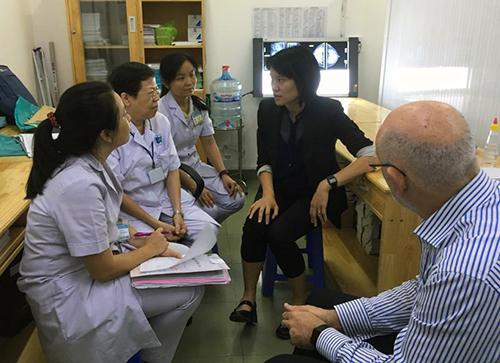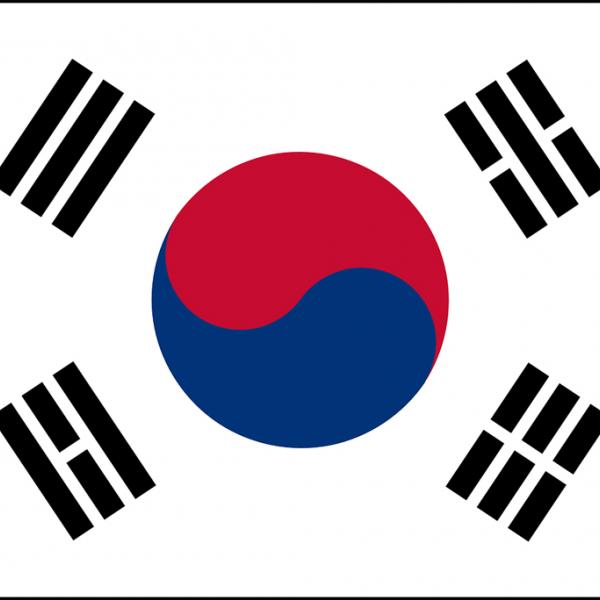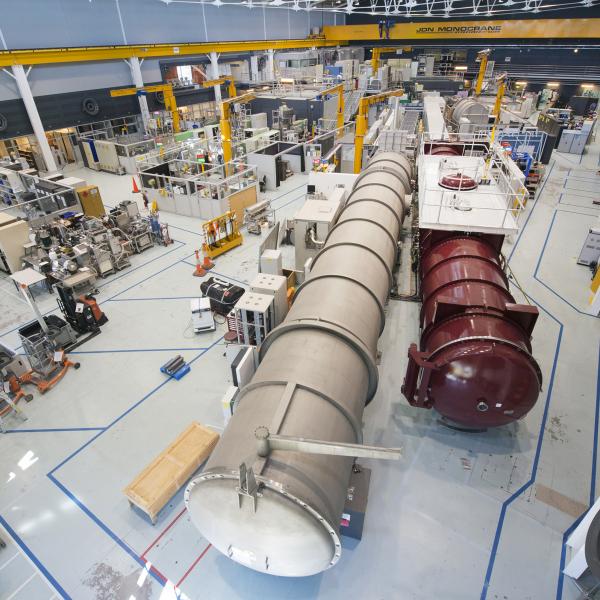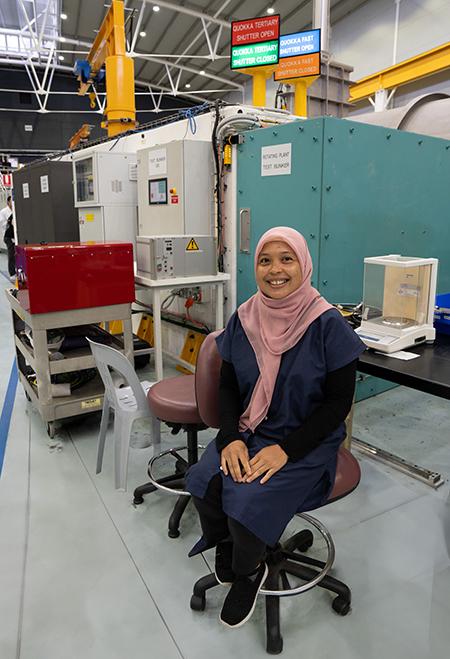
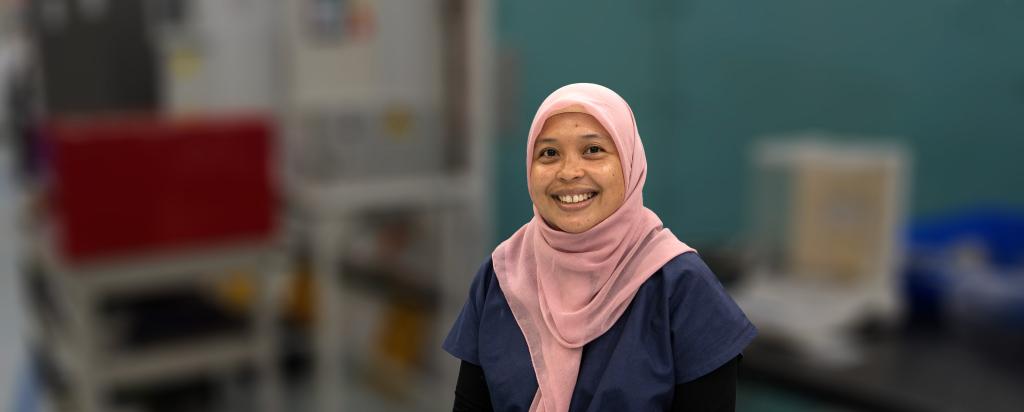
Published on the 7th March 2024 by ANSTO Staff
In 2024 the theme of the United Nations International Women’s Day is Invest in Women: Accelerate Progress which challenges the world to transform challenges into opportunities and shape a better future for us all.
ANSTO is very proud of all women in its workforce. This year we are featuring two women who have a connection to ANSTO and are contributing to the empowerment of women in STEM professions in Asia and the Pacific regions.
For the past year, the Australian Centre for Neutron Scattering has hosted Dr Indri Adilina, a Visiting Scientist from the Research Centre for Chemistry at the National Research and Innovation Agency (BRIN) in Indonesia, who is researching mesoporous silica and biobased carbon, materials widely used in catalysis, drug delivery, biological imaging and biosensors.
ANSTO has a longstanding relationship with BRIN and its predecessor organisation BATAN.
Dr Indri Adilina is an accomplished chemist who investigates advanced materials using nuclear techniques. Her area of focus is silica and carbon-based materials, derived from natural resources. She is gaining expertise on several neutron scattering instruments that she can take back to Indonesia, which operates several nuclear research reactors.

Although she uses multiple techniques; small and ultra-small angle neutron scattering on the Quokka and Kookaburra instruments have been helpful in understanding how ordered pore structures are formed during the synthesis of mesoporous silica and how substrates, such as proteins, interact with the silica material and shed light on the polydispersion of the silica-protein particles.
Quasielastic neutron scattering on Emu provided insights into the dynamics of these systems which is a key process in biosensor applications. Using inelastic neutron scattering on Taipan, she is understanding the surface characteristics of biomass-based carbon materials, known as biochar, and their interaction with various organic substrates during catalysis.
As Indonesia has the world’s largest geothermal source of silica and abundant carbon biomass source, it is an important area of research.
Dr Adilina attributes her interest in science to her excellent high school teachers and having scientists in the family.
After completing an undergraduate degree in chemistry at Padjadjaran University in Bandung, Indri decided to continue her education abroad.
She considers herself fortunate to have the opportunity to study abroad in Australia with a fellowship from Asia-Oceania Neutron Scattering Association (AONSA), a MEXT scholarship to complete her PhD in Japan and an international development grant from the Newton Fund to carry out research at ISIS in the UK.
Both Dr Adilina’s parents studied and pursued a career in science. Her mother left the profession to look after her family of six.
“Things have been somewhat easier for me than my mother’s generation, who faced more conventional attitudes towards women’s roles in society.”
“I have a female manager, who herself has a female supervisor, which is a little unusual,” said Dr Adilina.
“Role models are particularly important to young women thinking about a career in STEM; particularly if you want a family and a professional path.”
A mother of three, who is married to a physicist, Dr Adilina manages a family and professional commitments with the help of her husband and parents when she is away from Indonesia.
“I had to learn to prioritise things and find some balance between family and work commitments. It wasn’t easy but I managed.”
“The situation is improving in Indonesia for women who want to pursue a career in STEM and I hope my story will encourage others to follow a similar path.”
Dr Jamie Schulz, Director of the Australian Centre for Neutron Scattering stated, “It has been fantastic to host Dr Adilina at ANSTO over the past year and ANSTO is proud to support visiting scientists through programs such as the AONSA Young Research Fellowship and the International Atomic Energy Agency’s Technical Cooperation Programme.”
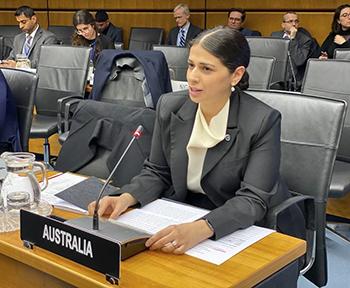
"Research shows that diversity leads to increased innovation, resilience, competitiveness, creativity, and even a healthy nuclear safety culture. Therefore, we need all women's ideas and unique experiences to accelerate developmental progress, and deliver better outcomes for society through nuclear science and technology, " said Marina Francis Counsellor (Nuclear) Australian Embassy and Permanent Mission to the UN and International Organisations
Associate Professor Mei Ling Yap, a senior staff specialist radiation oncologist at Liverpool and Macarthur Cancer Therapy Centres, has been involved with the IAEA Asia-Pacific Regional Cooperative Agreement for Research, Development and Training Related to Nuclear Science and Technology for Asia and the Pacific (RCA-AP) for many years as both National Project Coordinator (NPC) and Lead Country Coordinator (LCC) for Technical Cooperation (TC) projects.
‘The strengthening cancer management programs in RCA states parties through collaboration with national and regional radiation oncology societies project’ involved collaborating with national and regional radiation societies, ensuring their effective partnerships in the implementation of Regional Training Courses (RTCs).
In the RCA region, collaboration between regional and national societies can play a vital role in improving the quality of radiotherapy services and cancer care.
“The implementation of these training courses is immensely helped by strengthening collaboration, and self-sufficiency, of national regional radiation oncology societies in the RCA Asia Pacific region, said Dr Yap.
A/Prof Yap was co-chair of the Asia Pacific Radiation Oncology Special Interest Group (APROSIG-RANZCR), a volunteer organisation that supports low and middle-income radiotherapy departments in the Asia-Pacific through bilateral exchange, training and education until 2023.
APROSIG collaborates with a number of oncology departments in the Asia-Pacific, including hospitals within Cambodia and Mongolia, who are trying to expand their radiation services.
Currently, Dr Yap is the lead on a recent RCA project, ‘Strengthening cancer care and research by training oncology health professionals in RCA member states in data collection through radiation oncology electronic management systems.’
“The project aims to improve reliable country-specific data on cancer presentations, treatment and outcomes which are needed to facilitate well-directed and cost-effective interventions to improve the quality of cancer treatments in the region,” explained Dr Yap.
“By training radiotherapy professionals – radiation oncologists, radiation therapists, radiation oncology medical physicists, oncology nurses and information managers- from participating government parties in the use of electronic management systems (EMSs), the collected data can be used for analysis by organisations or government departments to develop programmes or policies to prevent cancer outcomes at a population level. “
A/Prof Yap also holds a conjoint Associate Professor appointment with the University of New South Wales and the University of Western Sydney.
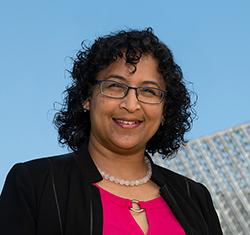
“Gender equality is very important to Australia, to ANSTO and to me personally, “ said Pamela Naidoo Ameglio (left), Group Executive, Nuclear Operations and Nuclear Medicine, who was speaking at an IAEA training workshop recently.
“As a global community, in 2015 when we agreed to the United Nations Sustainable Development Goals.
“The UN Sustainable Development Goals serve as a blueprint for sustainable development for all the world's peoples.
“It is a blueprint that expressly includes women and girls. The fifth SDG is to achieve gender equality.
“And this is why Australia provided funding to the IAEA flagship initiative Marie Sklodowska-Curie Fellowship Programme which supports women in the nuclear field, earmarked for women from the Pacific.
“Women are under-represented in the nuclear sector worldwide, including in Australia. As you set your strategic directions for your programmes, I encourage you to set gender targets. “
